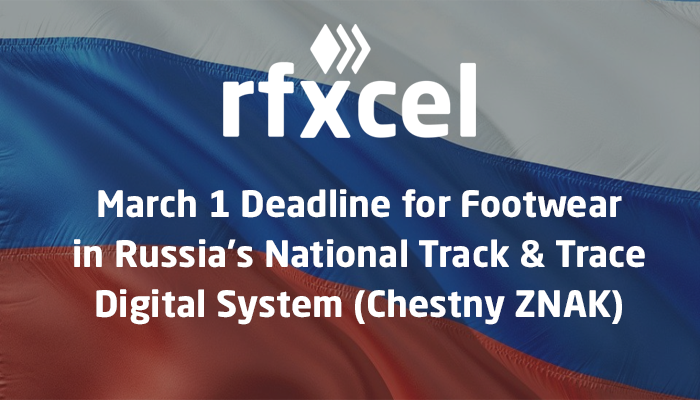Note: On February 29, 2020, Russia changed key deadlines for footwear. Read about the new dates here.
March is a big month for footwear companies doing business in Russia. The next major deadline for Russia’s National Track and Trace Digital System, known as Chestny ZNAK, is March 1. If you’re selling footwear in Russia, here’s everything you need to know about the regulations.
Some background on Chestny ZNAK
Russia’s Federal Law No. 425-FZ mandates that companies must connect and comply with Chestny ZNAK, which is operated by the Center for Research in Perspective Technologies (CRPT). Ratified on December 29, 2017, the complex regulations will affect virtually every industry, from footwear and pharmaceuticals to tires and tobacco.
The goal of Chestny ZNAK is to protect consumers by keeping fake and substandard products out of the market. Hallmarks include 2D barcodes, serialization, crypto codes, and secure reporting and records management. Companies that are not fully compliant risk exclusion from lucrative Russian markets. Deadlines vary by industry, but Russia aims to have the total supply chain transformation completed by 2024.
Let’s do a quick overview of Chestny ZNAK for the footwear industry, what’s happened so far in 2020, and what’s in store for March.
Chestny ZNAK 101 for footwear
Manufacturers, importers, distributors, wholesalers, and retailers had to begin labeling their products with 2D Data Matrix codes beginning July 1, 2019. The CRPT provides the codes to these supply chain stakeholders, who must be registered in the Chestny ZNAK system.
Each code has an ID code that determines a product’s position in the track and trace system and in the unified catalogue of goods. A code must contain ten data points, including a Global Trade Item Number (GTIN), a tax identification number, the brand name, and the materials used to make the shoes.
Each Data Matrix code must have a verification code — a crypto “tail” or crypto code. The CRPT also generates the crypto codes, which are essentially a string of unique numbers and letters. We’ve been following news about the Chestny ZNAK crypto codes. Check out our last major update here. For recent news about other regulations and industries, see our story here.
Footwear and Chestny ZNAK: What’s happened so far in 2020 and what’s coming in March
As of February 1, 2020, actors in the footwear supply chain were expected to have obtained all the equipment needed to receive, print, affix, and test the 2D Data Matrix codes and crypto codes. This includes a special device called an issue registrar, through which the CRPT sends the codes. Other gear includes barcode scanners, printers, and cash registers. Manufacturers, importers, distributors, wholesalers, and retailers were also expected to have mastered the new system.
March 1 is the next big deadline for the footwear industry. Here are the key points:
- Production and import of unlabeled shoes is prohibited.
- Wholesale and retail sale of unlabeled footwear is prohibited.
- Transfer of information about production, importation, and wholesale and retail sales to Chestny ZNAK becomes mandatory.
- Note: Unlabeled footwear purchased before March 1 may be imported until April 1.
- Note: Companies may label shoes made or acquired before March 1 until May 1, but only if they can document the date of manufacture or purchase.
Final thoughts
rfxcel is the undisputed leader in Russia compliance. We’ve prepared for Chestny ZNAK since 2018. We’re one of the few providers with active implementations in the country. We’ve tripled our workforce in Russia over the last year. Our team in Moscow provides our clients, which include major global consumer goods and pharmaceutical companies, the quickest time to market while fully automating their compliance reporting.
No matter how far along you are in your preparations to meet Chestny ZNAK requirements, we are who you need to talk to — even if you’re already working with another provider. Our powerful software ensures companies in any industry will remain compliant with Russia’s complex regulations while mastering their supply chains with end-to-end traceability and rich, actionable data mined right down to the unit level.
Email us today at russia@rfxcel.com to schedule a conversation with one of our supply chain experts in Moscow. We think you’ll be impressed when you learn more about our capabilities in Russia.
And be sure to read “Russia 2020: A Guide to Consumer Goods Supply Chain Compliance,” an easy-to-understand white paper that explains the fundamentals of the Russian legislation and puts it all in context.





